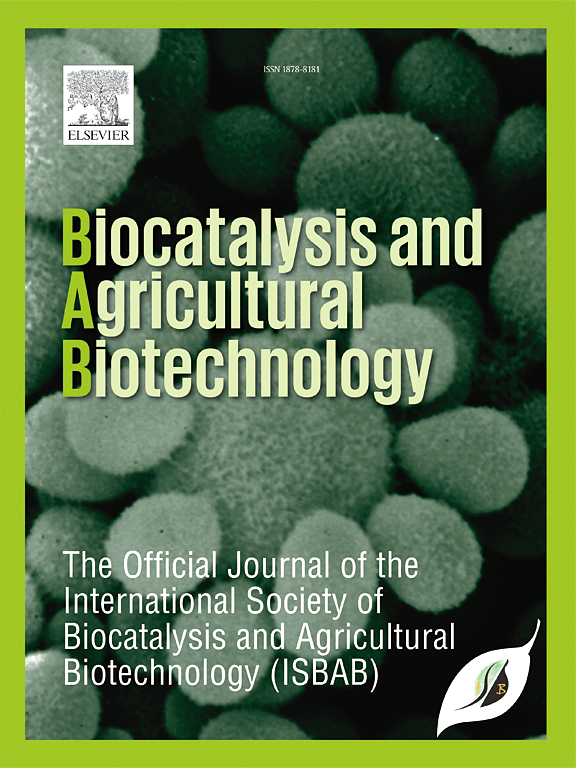Thymol rich essential oil from Assam ecotype of Ocimum gratissimum as a biocontrol agent for sheath blight disease of rice
IF 3.4
Q2 BIOTECHNOLOGY & APPLIED MICROBIOLOGY
引用次数: 0
Abstract
Preventing crop losses caused by harmful plant pathogens through eco-friendly ways is paramount for food security and environmental sustainability. Envisioning this, the current study evaluates the biocontrol potential of essential oil extracted from Ocimum gratissimum from an Assam ecotype and its primary component, thymol, against Rhizoctonia solani, the pathogen causing sheath blight disease in rice. GC-MS analysis identified thymol as the dominant compound in the essential oil, contributing significantly to its antifungal activity. Both O. gratissimum essential oil and thymol showed strong in-vitro inhibition of R. solani, with complete growth inhibition at 1000 ppm, while thymol exhibited superior efficacy. Both agents also effectively inactivated sclerotia, a key survival mechanism of the pathogen. In-planta assays demonstrated a significant reduction in lesion size with O. gratissimum essential oil and thymol treatments, outperforming the chemical fungicide propiconazole. Thymol was particularly effective in reducing disease severity, making it a promising eco-friendly alternative. The unique phytochemical profile of the Assam ecotype of O. gratissimum further underscores its potential for sustainable disease management. These results underscore the potential of O. gratissimum essential oil and thymol as eco-friendly alternatives to synthetic fungicides. By reducing reliance on chemical inputs, their application can mitigate risks associated with fungicide resistance and environmental contamination while promoting sustainable disease management strategies.
富百里酚精油对水稻纹枯病的生物防治研究
通过生态友好的方式防止有害植物病原体造成的作物损失对粮食安全和环境可持续性至关重要。考虑到这一点,目前的研究评估了从阿萨姆生态型的茴香中提取的精油及其主要成分百里香酚对引起水稻纹枯病的根瘤菌solani的生物防治潜力。GC-MS分析表明,百里香酚是其主要成分,具有明显的抗真菌活性。栀子精油和百里香酚均表现出较强的体外抑制作用,在1000 ppm时具有完全的生长抑制作用,其中百里香酚的抑制作用更强。这两种药物还能有效灭活菌核,这是病原体的关键生存机制。植物内试验表明,大草精油和百里香酚处理显著减少了病变大小,优于化学杀菌剂丙环唑。百里香酚在降低疾病严重程度方面特别有效,使其成为一种有前途的环保替代品。阿萨姆邦O. gratissimum生态型独特的植物化学特征进一步强调了其可持续疾病管理的潜力。这些结果强调了草精油和百里香酚作为合成杀菌剂的环保替代品的潜力。通过减少对化学品投入的依赖,它们的应用可以减轻与杀菌剂耐药性和环境污染相关的风险,同时促进可持续的疾病管理战略。
本文章由计算机程序翻译,如有差异,请以英文原文为准。
求助全文
约1分钟内获得全文
求助全文
来源期刊

Biocatalysis and agricultural biotechnology
Agricultural and Biological Sciences-Agronomy and Crop Science
CiteScore
7.70
自引率
2.50%
发文量
308
审稿时长
48 days
期刊介绍:
Biocatalysis and Agricultural Biotechnology is the official journal of the International Society of Biocatalysis and Agricultural Biotechnology (ISBAB). The journal publishes high quality articles especially in the science and technology of biocatalysis, bioprocesses, agricultural biotechnology, biomedical biotechnology, and, if appropriate, from other related areas of biotechnology. The journal will publish peer-reviewed basic and applied research papers, authoritative reviews, and feature articles. The scope of the journal encompasses the research, industrial, and commercial aspects of biotechnology, including the areas of: biocatalysis; bioprocesses; food and agriculture; genetic engineering; molecular biology; healthcare and pharmaceuticals; biofuels; genomics; nanotechnology; environment and biodiversity; and bioremediation.
 求助内容:
求助内容: 应助结果提醒方式:
应助结果提醒方式:


